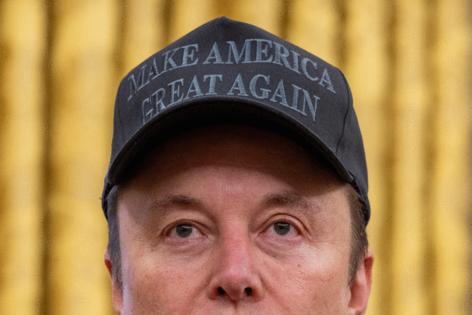Matthew Yglesias: Democrats need to channel their inner DOGE
Published in Op Eds
The American public, according to the president, was “sick and tired of wasteful spending.” So he proposed to “slash federal hiring and reduce the federal workforce” as well as “restrain federal pay.” For good measure, he threw in a plan to “remove needless regulations.”
Was this Ronald Reagan in 1981? George W. Bush two decades later? Donald Trump last week? None of the above: It was Jimmy Carter in 1978. Democrats were campaigning for government efficiency back when Elon Musk still had his baby teeth — and part of what they need to do now is get back in touch with their inner DOGE.
Carter’s speech was in response to the particulars of the late-1970s inflation crisis. But it also reflected a core part of his political identity; indeed, some historians say he was excessively focused on eliminating wasteful spending. In 1977, he identified a “hit list” of wasteful pork-barrel items he wanted eliminated from an appropriations bill, prompting a rare battle between a newly elected president and a congressional majority of his own party. Carter lost and never quite recovered.
The next Democratic president, Bill Clinton, was a more skilled politician and rehabilitated the cause as a Democratic issue. He undertook a sweeping “reinventing government” initiative, led and promoted by Vice President Al Gore. Many veterans of the Clinton administration returned to government with Barack Obama and carried forward the reformist zeal.
Just a few months after taking office, Obama dedicated one of his weekly radio addresses to the need for the federal government to “tighten its belt” and outlined $2 trillion in proposed spending cuts. His administration initiated a two-year pay freeze for civilian federal employees. In his 2011 State of the Union address, one of his best lines was about the need for institutional reform and regulatory simplification: “The Interior Department is in charge of salmon while they’re in fresh water, but the Commerce Department handles them when they’re in salt water. And I hear it gets even more complicated once they’re smoked.”
None of this is meant as a defense of everything Musk’s Department of Government Efficiency is doing, much of which is cruel, legally dubious, or both. But it is to say that that Trump supporters are not quite correct when they complain that Democrats would never take on the bureaucracy.
They have more of a point when they say that neither Joe Biden nor former Vice President Kamala Harris did much about the issue during their administration. Biden literally ran one of these efficiency task forces under Obama, and many of his senior staffers were intimately involved in the Clinton or Obama efforts. It’s possible they were jaded by their knowledge of the limits of these campaigns, or complacent about promoting them.
Now, with Trump taking a wrecking ball to many key government institutions, it is becoming more clear why pre-Biden Democrats liked to make a big show of wielding a scalpel.
Democrats, after all, are the party that tends to be inclined to want to spend more money on things. This gives them a kind of double burden to show that they care about waste. On the political front, it’s important to show good faith by demonstrating awareness of problems in the public sector and a desire to solve them. A Republican can easily cite existing dysfunction as a rationale for opposing additional spending, and is only no particular obligation to fix anything. A Democrat doesn’t have that luxury.
On the substantive front, the problem with even the best new initiative is that nobody wants to pay higher taxes to fund it. The obvious alternative is that if your new idea is so good, why not finance it by scrapping some other less-good idea?
Opponents of Trump’s war on USAID, for example, say he’s strangling highly effective public-health programs that save millions of lives. Proponents say he’s cutting off a dizzying array of grants, many of which are dubious on their face and have no demonstrated record of efficacy. Both sides are right. It is genuinely scandalous that Trump is kneecapping the global AIDS prevention program started by George W. Bush and the worldwide vaccination program for children. But by the same token, it would have made a lot of sense for prior administrations less imbued with nationalist zeal to cut the least effective programs and put extra money into the good ones.
For now, what’s done is done. Democrats have no better option than to fight against bad cuts, know that some of them will take effect, and try to put good programs back in place later. This task has been made harder by Biden’s decision to break with the modern legacy of reformist, good-government Democrats. Maybe he thought the drive for government efficiency needed to take a backseat to the need for coalitional solidarity. But the cost to Democrats has been diminished credibility as stewards of public money — or simply as leaders with good judgment who can tell the difference between a valuable program and a dud.
Looking ahead to 2026 and even 2028, Democrats ought to bear this in mind and return to tradition. The party of bigger government and a more active state also needs to be the party of better government and more efficient administration.
____
This column does not necessarily reflect the opinion of the editorial board or Bloomberg LP and its owners.
Matthew Yglesias is a columnist for Bloomberg Opinion. A co-founder of and former columnist for Vox, he writes the Slow Boring blog and newsletter. He is author of “One Billion Americans.”
©2025 Bloomberg L.P. Visit bloomberg.com/opinion. Distributed by Tribune Content Agency, LLC.




























































Comments